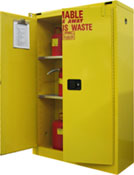- Cabinets
- Safety Storage Cabinets
- Flammable Storage
- Hand Sanitizer Storage
- Stainless Steel Storage
- Drum Storage
- Paint & Ink Storage
- Laboratory Storage
- Acid & Corrosive Storage
- Hazardous Waste Storage
- Wall Mountable Storage
- Pesticide Storage
- Weatherproof Storage
- Dual Access Storage
- Tooling Storage
- Cylinder Storage
- Medical Gas Cylinder Storage
- LP Cylinder Storage
- Single Wall Storage
- Industrial Storage
- Stainless Steel Storage
- Spill Containment Storage
- Custom Storage
- Custom Cabinets
- Custom Cabinet - Form
- Miscellaneous
- Drum Spill Stations
- Parts & Accessories
- Replacement Parts
- Features & Compliance
- Standard Features
- Code & Compliance
- OSHA Training
- Buildings
- Storage Buildings
- Hazmat Storage Buildings
- Chemical Storage Buildings
- Custom Buildings
- Custom Building - Form
- Tornado Shelters
- Tornado Safe Rooms & Shelters
- Bid Specifications
- Hazmat Storage
- Chemical Storage
- Frequently Asked Questions
- Steel Doors
- New Arrivals
- Distributors
- Contact Us

- Safety Storage Cabinets
- Cylinder Storage
- Custom Storage Cabinets
- Drum Spill Stations
- Mobile Work Benches
- Safety Storage Buildings
- Tornado Shelters
- Distributors
- Code & Compliance
- Catalog
- FAQ
- Contact Us
- Home
HAZARDOUS WASTE STORAGE
Hazardous waste is waste that is dangerous and/or potentially harmful to our health or the environment. Hazardous wastes can be discarded commercial products, like cleaning fluids or pesticides, or the by-products of manufacturing processes.
The safe way to collect and store Flammable Hazardous Waste is with Securall Hazardous Waste Drum Cabinets. Cabinets are equipped with a shelf to hold 5 gallon containers.
The Resource Conservation and Recovery Act (RCRA) has made it mandatory that hazardous waste be collected and disposed of properly. Securall offers the largest capacity drum storage cabinets in the industry. All Hazardous/Environmental Waste Drum Cabinets are equipped with Roller Bottoms for easy loading of heavy drums.

Soild Waste Storage
- Municipal solid waste (MSW), commonly known as trash or garbage (US), refuse or rubbish (UK) is a waste type consisting of everyday items we consume and discard. It predominantly includes food wastes, yard wastes, containers and product packaging, and other miscellaneous inorganic wastes from residential, commercial, institutional, and industrial sources.[1] Examples of inorganic wastes are appliances, newspapers, clothing, food scrapes, boxes, disposable tableware, office and classroom paper, furniture, wood pallets, rubber tires, and cafeteria wastes. Municipal solid waste does not include industrial wastes, agricultural wastes, and sewage sludge. The Nonhazardous Solid Waste Management Regulations require that the collection and temporary storage of solid wastes at businesses, office buildings, multi-family residential complexes, restaurants, hotels and other similar commercial facilities be properly maintained to prevent environmental, public health and public nuisance problems.All solid waste should be stored in such a manner that will not cause or create fire, safety, or health hazards or provide food or harborage for animals and vectors (mosquitoes, rats, etc). All solid waste should be stored in such a manner that will not cause or create fire, safety, or health hazards or provide food or harborage for animals and vectors (mosquitoes, rats, etc). It is the responsibility of the occupant of a residence or the owner or manager of an establishment to utilize a waste storage system that will include containers of adequate size and strength, and in sufficient numbers, to contain all solid waste that the residence or other establishment generates in the period of time between collections. The owner or, if leased, the leasee of the storage containers shall be responsible for compliance with this requirement. Solid wastes shall be collected and transported to a disposal facility at a frequency adequate to prevent propagation and attraction of vectors and the creation of a public health nuisance, especially putrescible wastes. Putrescible wastes are those materials that break down quickly in such a manner that causes odors and attracts disease carrying vectors.
POL Storage - Vulnerability of petroleum/oil/lubricant (POL) storage
LIQUEFIED PETROLEUM GAS STORAGE
DIESEL FUEL STORAGE
VAPOR EMISSION CONTROL SYSTEM, HEATING FUEL STORAGE





